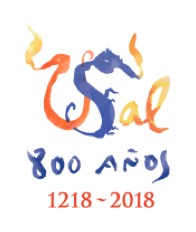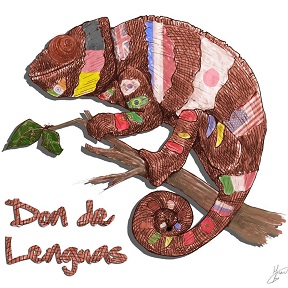Three participants will engage in a debate about different current topics relating to translation theory and practice. Each round table will have a duration of one hour.
Roundtable topics and participants:
1A.Translation, Migrations and Asymmetries in the Globalised World
- Languages: EN ES (Interpreting, with student participation, will be provided) - Auditorio
Chair: Africa Vidal Claramonte (Univ. Salamanca)Participants:
Karen Bennett (Univ. Nova de Lisboa)
Karen Bennett has an MA and PhD in Translation Studies from the University of Lisbon, and lectures in History and Theory of Translation, Scientific Translation and Translation Research Methods at Nova University, Lisbon. She is also a member of the Centre for English, Translation and Anglo-Portuguese Studies (CETAPS), where she coordinates the Translationality strand. Her research interests include: translation and the transmission of knowledge; translation and performativity; lingua francas, multilingualism and linguistic hybridity; language and power; and intersemiotic translation. She is a member of the advisory board of The Translator and an associate of the ARTIS initiative (Advancing Research in Translation and Interpreting Studies). Her recent publications include:
- International English and Translation. Special Issue of The Translator 23/4 (co-edited with Rita Queiroz de Barros). 2017.
- ‘Foucault in English: the politics of exoticization’. Target 29/2: 224-245. 2017.
- ‘Towards an epistemological monoculture: mechanisms of epistemicide in European research publication’. In English as an Academic and Research Language, Ramón Plo Alastrué y Carmen Pérez-Llantada (eds), Berlin: De Gruyter Mouton. 2015: 9-35.
- The Semiperiphery of Academic Writing: Discourses, Communities and Practices, London: Palgrave Macmilla, 2014.
She is currently co-editing, with Rita Queiroz de Barros, a volume entitled Hybrid Englishes and the challenge of/for translation: identity, mobility and language change, to be published with Routledge later this year.
Loredana Polezzi (Cardiff Univ.)
Loredana Polezzi is Professor of Translation Studies in the School of Modern Languages at Cardiff University. Her main research interests are in the connection between translation, migration and other forms of travel. Her work focuses on theories and practices of multilingualism, translation and self-translation. With Rita Wilson, she is co-editor of The Translator. She is a co-investigator in the research projects ‘Transnationalizing Modern Languages’ and 'Transnationalizing Modern Languages: Global Challenges', funded by the UK’s Arts and Humanities Research Council. She is also a founding member of the ‘Cultural Literacy in Europe’ network and the current president of the International Association for Translation and Intercultural Studies (IATIS).
1B.Teaching Literary Translation: Bridging the Gap between Research and Professional Activity
- Language: ES - Sala Menor
Chair: Belén Santana López (Univ. Salamanca)Participants:
Miguel Sáenz Sagaseta de Ilúrdoz (Real Academia Española)
Miguel Sáenz Sagaseta de Ilúrdoz (Larache, 1932). PhD in Law Studies and BA in German Philology by Complutense University of Madrid. "Doctor honoris causa" in Translation and Interpreting by the University of Salamanca. A jurist, a German philologist and a translator for the UN. He is a retired General Auditor of the Air Force Legal Assistance Corps. He has translated the works of Franz Kafka, Bertolt Brecht, Thomas Bernhard, Michael Ende and Günter Grass, to name but a few. Translation awards: National Prize 1981; National Prize for the Translation of Children’s Literature 1983; National Award for Outstanding Lifetime Achievement as a Translator in 1992; Austrian Prize for Literary Translation in 1996; German Goethe Medal in 1997; Order of Merit of the Federal Republic of Germany in 1997; Aristeion Prize of the European Union in 1998; and Asociación de directores de escena de España [Spanish Association of Scene Directors] Prize in 2006. He is a member of the Akademie für Sprache und Dichtung (since 1999) and the Real Academia Española (since 2013). He is not a translation academic, but rather a translator, although he is the author of Servidumbre y grandeza de la traducción (2013) and Dieciocho conferencias nada magistrales y dos discursos de circunstancias (2013).
Mª Teresa Gallego Urrutia (Literary translator)
María Teresa Gallego Urrutia (Madrid, 1943) completed her primary and secondary education in the Liceo Francés de Madrid, a French international school. In 1966, she obtained a Degree in French Studies from the Complutense University of Madrid. She started translating French literature in 1961 and, since then, she has translated around 200 books written by French and Francophone authors, both classical and contemporary. In 1974, she achieved a senior academic position in French teaching at the Gregorio Marañón Institute in Madrid. She has received several awards for her work as a translator, such as: the National Prize for the translation of Romance Languages for Diario del ladrón, by Jean Genet in 1977 and the Stendhal Prize for Impresiones de África, by Raymond Roussel in 1991. In 2003, she was awarded the Ordre des Arts et des Lettres by the French Government and in 2008 the National Award for the Life’s Work of a Translator. In 2011, she obtained the Mots Passants Prize by the Department of French at the Universidad Autónoma de Barcelona for El horizonte by Patrick Modiano, whilst in 2013 she received the Esther Benítez Prize for her translation of La señora Bovary by Gustave Flaubert. Between the academic years of 2008-2009 and 2013-2014, she gave lectures on issues related to the intellectual property of the translator at the Translators´ Institute (Complutense University of Madrid). In 1983, she was one of the founding members of the translation association ACE Traductores. She collaborates in the daily section on translation El trujamán, published by the Centro Virtual del Instituto Cervantes.
2A.Translation and Technologies
- Languages: EN ES ES EN (Interpreting, with student participation, will be provided) - Auditorio
Chair: Jesús Torres-del-Rey (Univ. Salamanca)Participants:
Pilar Sánchez-Gijón (Univ. Autónoma de Barcelona)
Frank Austermühl (Aston Univ.)
2B.Terminology and Translation
- Language: ES - Sala Menor
Chair: Joaquin Garcia Palacios (Univ. Salamanca)Participants:
Mª Teresa Cabré i Castellví (Univ. Pompeu Fabra)
Pamela Faber (Univ. Granada)
3A.Teaching Today and Tomorrow
- Languages: EN ES ES EN (Interpreting, with student participation, will be provided) - Auditorio
Chair: Silvia Roiss (Univ. Salamanca)Participants:
Don Kiraly (Univ. Mainz)
Dorothy Kelly (Univ. Granada)
3B.Women Interpreters, Researchers and Lecturers
- Languages: DE ES ES DE (Interpreting, with student participation, will be provided) - Sala Menor
Chair: Jesús Baigorri Jalón (Univ. Salamanca)Participants:
Dörte Andres (Univ. Mainz)
Dörte Andres is Professor of Translation and Interpreting in the Department of Translation, Linguistics and Cultural Studies (FTSK) at Johannes Gutenberg University Mainz (JGU), where she currently teaches and carries out research. Her research interests include: interpreting in conflict areas, the history of interpreting (centred on national socialism) and interpreting pedagogy. At present, her research projects at the JGU focus on modelling the interpreting process based on Cognitive Psychology and on the development of a competence standard from the perspective of new information and communication technologies.
Ángela Collados Aís (Univ. Granada)
4A.Dubbing and Subtitling: Translation for Entertainment and Information
- Languages: ES EN (Interpreting will be provided) - Auditorio
Chair: Fernando Toda Iglesia (Univ. Salamanca)Participants:
Jorge Díaz Cintas (Univ. College of London)
Jorge Díaz Cintas is Professor of Translation Studies and the founder of the Centre for Translation Studies (CenTraS), University College London. He is the author of numerous books and articles on Audiovisual Translation. From 2002 to 2010, he was the President of the European Association for Studies in Screen Translation and is now one of its Directors. He is Chief Editor of the Peter Lang series New Trends in Translation Studies and he is a member of the EU LIND-Web project. He has received the Jan Ivarsson Award (2014) and the Xènia Martínez (2015) Prize for his work on Audiovisual Translation.
Frederic Chaume Varela (Univ. Jaume I)
Frederic Chaume is a Professor of Audiovisual Translation at Universitat Jaume I (Spain), where he teaches audiovisual translation theory and dubbing; and Honorary Professor at University College London (UK), Universidad Ricardo Palma (Perú) and Universidad Peruana de Ciencias Aplicadas (Perú). He is author of the books Doblatge i subtitulació per a la TV (Eumo, 2003), Cine y Traducción (Cátedra, 2004), Audiovisual Translation: Dubbing (Routledge, 2013), and co-author of Teories Contemporànies de la Traducció (Bromera, 2010). He has also coedited two books (La Traducción en los Medios Audiovisuales; La Traducción Audiovisual: Investigación, Enseñanza y Profesión) and special journal issues (Perspectives, Prosopopeya) and is the director of the TRAMA book series (Publicacions de la Universitat Jaume I), the first collection of monographs on audiovisual translation. He has given several invited lectures on audiovisual translation and translation for dubbing in international translation studies conferences and many European and American universities, and also teaches regularly in some of them. He coordinates the research group TRAMA (www.trama.uji.es) and has been awarded the Berlanga Award and the Xènia Martínez Award for his support to dubbing and his constant university training in this field.
4B.Translating the Sciences: Universal Perspectives and Diverse Approaches
- Language: ES - Sala Menor
Chair: Cristina Valderrey Reñones (Univ. Salamanca)Participants:
Esther Monzó i Nebot (Univ. Jaume I)
Esther Monzó is Assistant Professor in the Department of Translation and Communication at Jaume I University. Between 2013 and 2015, she was a Professor in the Department of Translation at Graz University (Austria), where she gave lectures on issues pertaining to the sociology of translation and interpreting. In 2002, she presented her PhD on the practice of legal translation and interpreting, focusing on the sociological aspects of both professions and Bourdieu's economy of practice. Her current research centres on the ways in which translation and interpreting can be used as tools when managing diversity as well as intercultural and intergroup communication. In her works, she has focused on K. Lewin’s action research, computer-assisted translation tools, corpus-based translatology and legal translation training. She has been invited to teach at different European and Latin American Universities and she has worked within the area of translation at the United Nations, the World Trade Organisation and the World Intellectual Property Organisation (Switzerland). She is a member of the Inter-university Institute for Valencian Language Studies (IIFV) and the “Purificación Escribano” University Institute for Feminist and Gender Studies as well as the Director of the research group TRAP, centred on translation, identity and diversity in Linguapax International.
Óscar Jiménez Serrano (Univ. Granada)
5A.Translation and the Media
- Languages: EN ES (Interpreting, with student participation, will be provided) - Auditorio
Chair: Mª Rosario Martín Ruano (Univ. Salamanca)Participants:
Luc Van Doorslaer (University of Tartu / KU Leuven)
Luc van Doorslaer is Chair Professor in Translation Studies at the University of Tartu (Estonia). He is also the director of CETRA, the Centre for Translation Studies at the University of Leuven (Belgium). As a Research Associate he is affiliated with Stellenbosch University (South Africa). Since 2016 he has been Vice President of EST, the European Society for Translation Studies. Together with Yves Gambier, he is the editor of the online Translation Studies Bibliography (13th release 2010-13) and the four volumes of the Handbook of Translation Studies (2010-2013). Other recent books edited include Eurocentrism in Translation Studies (2013), The Known Unknowns of Translation Studies (2014), Interconnecting Translation Studies and Imagology (2016) and Border Crossings. Translation Studies and other Disciplines (2016). His main research interests are: journalism and translation, ideology and translation, imagology and translation, institutionalization of Translation Studies.
Roberto Valdeón García (Univ. Oviedo)
Roberto A. Valdeón is Professor in English Studies at the University of Oviedo, Spain. He is a Member of the Academy of Europe, the Editor-in-Chief of Perspectives Studies in Translation Theory and Practice and General Editor of the Benjamins Translation Library. He has published over a hundred articles, books and book chapters on EFL and translation, almost half of them included in the Arts & Humanities Citation Index, the Social Sciences Citation Index or Scopus, including contributions to journals such as Across Languages and Cultures, Meta, Intercultural Pragmatics, Terminology, Bulletin of Spanish Studies, Target, Babel, International Journal of Applied Linguistics, Languages in Contrast, Philological Quarterly, Journalism, Translation Studies, and Translating and Interpreting Studies. He has been a visiting scholar at the University of Massachusetts Amherst, US, and a Visiting Professor at the University of Leuven, Belgium, and has been appointed Research Fellow at the University of the Free State, South Africa, for the period 2014-2020, and Honorary Professor at Jinan University, Huazhong University of Science and Technology, Nankai University and Beijing International Studies University in China, and at the University of Stirling in the UK.
5B.Linguistic Norm for Translators
- Language: ES - Sala Menor
Chair: José M. Bustos Gisbert (Univ. Salamanca)Participants:
Ángel López García (Univ. Valencia)
PhD in Romance Studies from the University of Zaragoza. Professor of Linguistics at the University of Valencia (since 1981). He teaches both in the Degree and the Master’s Degree in Translation and Intercultural Mediation. AWARDS: XIII Premio Anagrama de Ensayo (1985); VIII Premio Constitución de Ensayo (1990); Prix Honoré Chavée de l'Académie Française (2001). HONORARY DISTINCTIONS: He is a member of the North American Academy of the Spanish Language. "Doctor honoris causa" by the UNED. MAIN BOOKS published in the last ten years: El boom de la lengua española, 2007; The neural basis of language, 2007; La lengua común en la España plurilingüe, 2009; Pluricentrismo, hibridación y porosidad en la lengua española, 2010; Anglohispanos, 2010; (con Montserrat Veyrat), Lingüística aplicada a la traducción, 2012; Los mecanismos neuronales del lenguaje, 2014; El español de Estados Unidos y el problema de la norma lingüística, 2014, Teoría del Spanglish, 2015. He has been a Visiting Professor at the Universities of Virginia, Minnesota, Mainz, Tucumán, Aarhus and Shanghai International. He has regularly participated as a lecturer in diverse Master courses at the Universities of Salamanca, Palermo, Cádiz, Carlos III and the UNED.





